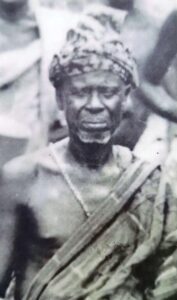BOAKYE TENTEN
- 4 Min Read
Boakye Tenten (circa 1818- November 1884) of Asante had a career in public office which spanned the reigns of four kings of Asante, during which time he demonstrated political and administrative skills of a high order. He was the son of an Okyeame (senior spokesman) of the Asantehene, Osei Bonsu (ruled 1800-24). Through his mother, Birago of Korase, near Kumase, Boakye Tenten could claim descent from the Asantehene Osei Kwadwo (ruled 1764-77).

PHOTO CAPTION: Boakye Tenten SOURCE: EA Library
He spent his childhood in Kumase, being trained in the responsibilities of the Boakye Yam Panin stool (the spokesman’s stool in Kumase) by his father, Oti Panin, who died in 1826, and by his father’s successor in office, Kofi Boakye. Even at an early age Boakye Tenten became known for his wit and his unusual memory in detail. In his early 30s, he was appointed resident commissioner of Salaga, the Gonja town north of the Volta River in what is now the Savannah Region. Salaga was then the most important of Asante’s northern market towns, and Boakye Tenten was responsible to the Asantehene and his council for its affairs. Discharging his duties efficiently, and thus enhancing his reputation, he was recalled to Kumase to take the Boakye Yam Panin stool, which had become vacant through the death of Kofi Nti in or about 1852.
He married Kofi Nti’s widow, Afua Kobi, shortly after, and so became the stepfather of, among others, two future kings of Asante: Kofi Karikari (who was to rule from 1867-74), and Mensa Bonsu (who was to rule from 1874- 83). When Afua Kobi became Asantehemaa (Queenmother) in about 1858, Boakye Tenten’s influence in Kumase politics was much strengthened. He served the Asantehene Kwaku Dua I (reigned 1834- 67) loyally, and became a strong adherent of that king’s cardinal policies of “Peace, Trade, and Open Roads”.
During the reign of the Asantehene Kofi Kakari, Boakye Tenten found himself in opposition to the policies of the dominant war clique or party. At the time of the British invasion of Asante in 1874, Boakye Tenten made an energetic but fruitless last-minute effort to negotiate a settlement with the British commander, Sir Garnet Wolseley, (1833- 1913). Later that year, Boakye Tenten was among those who forced Kofi Kakari to abdicate. Under the new Asantehene, Mensa Bonsu, Boakye Tenten was immediately entrusted with a mission to dissuade the Bekwaihene (ruler of Bekwai, a state 15 mi [24 km] south of Kumase), Yaw Opoku, from giving support to the movement for the secession of Dwaben, a state 15 mi (24 km) northeast of Kumase, which he successfully concluded in May 1875.
In 1877, partisans of the ex-Asantehene, Kofi Kakari, unsuccessfully attempted to overthrow Mensa Bonsu, and the first target of the rebels was the “old guard” of the Kwaku Dua men. Boakye Tenten was severely wounded, but he recovered, and in early 1881 he was chosen to head a large mission to the Gold Coast, charged with arriving at a workable arrangement concerning outstanding problems between Asante and the Colony. In a series of meetings with Governor Sir Samuel Rowe (term of office 1881 – 84) at Prasu, 55 mi (88 km) north of Cape Coast, and at Elmina, a measure of agreement was reached.
After this, Boakye Tenten made a tour of the coastal towns between Elmina and Accra before returning to Kumase in October. In the course of his six-month stay in the Gold Coast Colony, however, Boakye Tenten had become acutely aware of British aspirations to establish direct commercial and political relations with towns in the northern hinterlands of Asante – particularly Bondoukou (now in Côte d’Ivoire) in the north-west, and Salaga in the northeast. Perceiving the grave strategic threat to Asante interests, Boakye Tenten became committed to the view that the negotiation of a treaty of trade and friendship with the French government was essential in order to resist British pressures.
Although Boakye Tenten remained personally loyal to Mensa Bonsu, he is recognised as an accomplished act to the coup which led to the Asantehene’s overthrow early in 1883. He emerged as one of the leaders of the opposition to the restoration of Kofi Kakari. In August 1883, he was captured by the partisans of Kofi Kakari near Kumase but, surprisingly, was released. Kofi Kkari declared, on this occasion, that he would not kill his own stepfather. At the beginning of the civil war which broke out after the death of both Kwaku Dua II and Kofi Kakari in June 1884, Boakye Tenten accompanied a Kumase expedition against Atwuma and Manso, towns to the southwest of the capital. He was captured and executed in November 1884. He was succeeded in office by his (possibly adopted) son, Kwaku Fokuo.
IVOR WILKS



